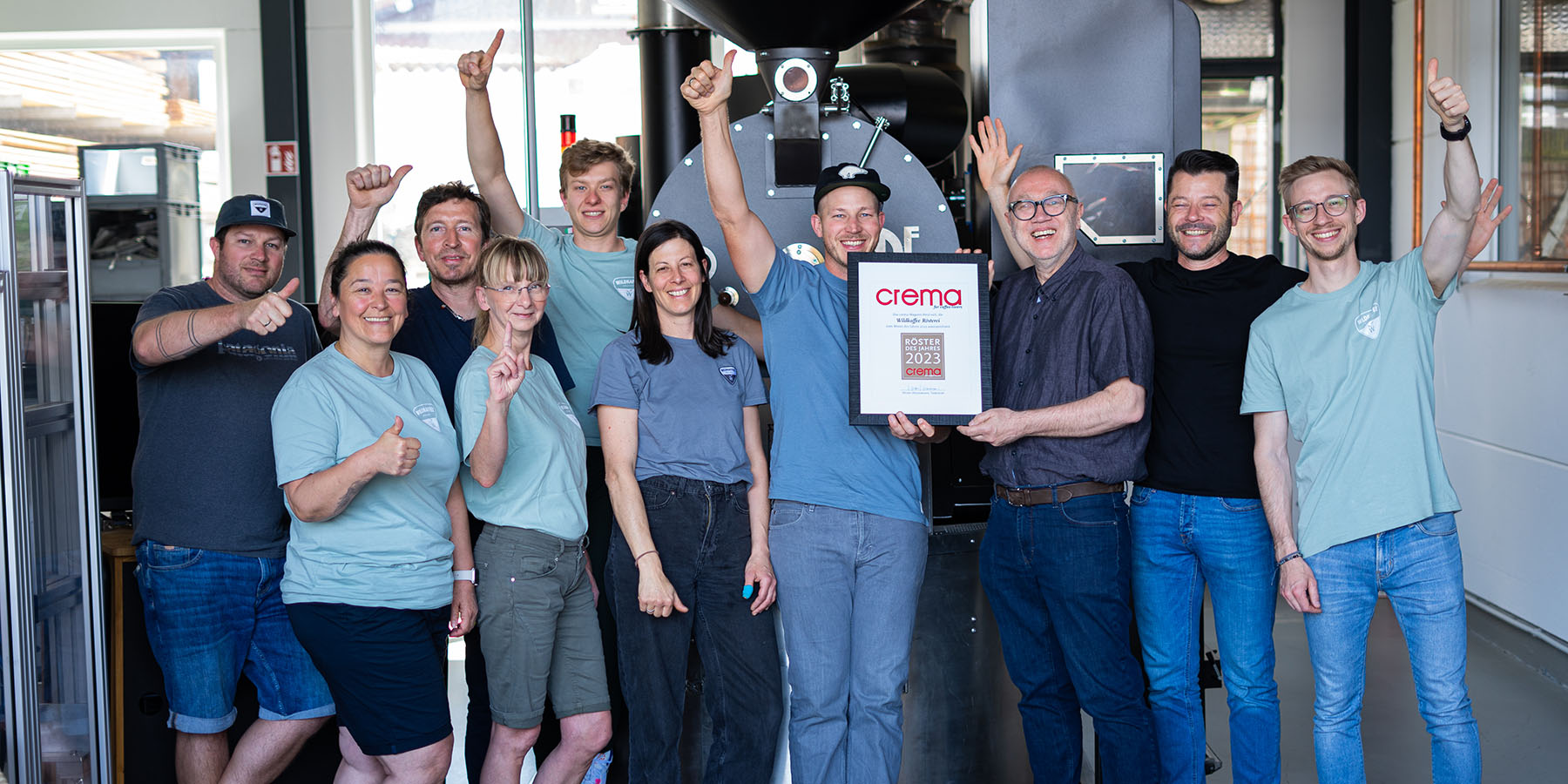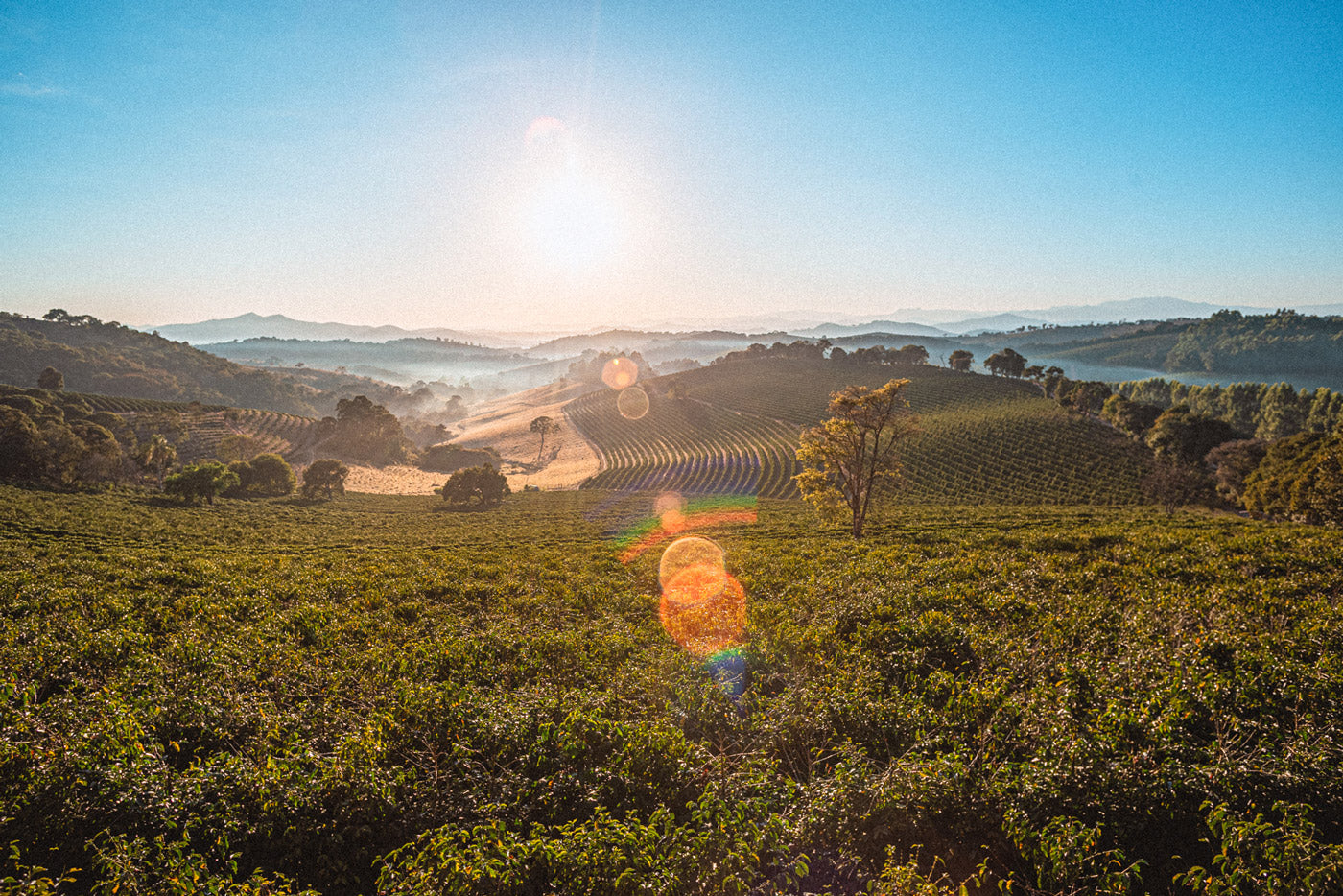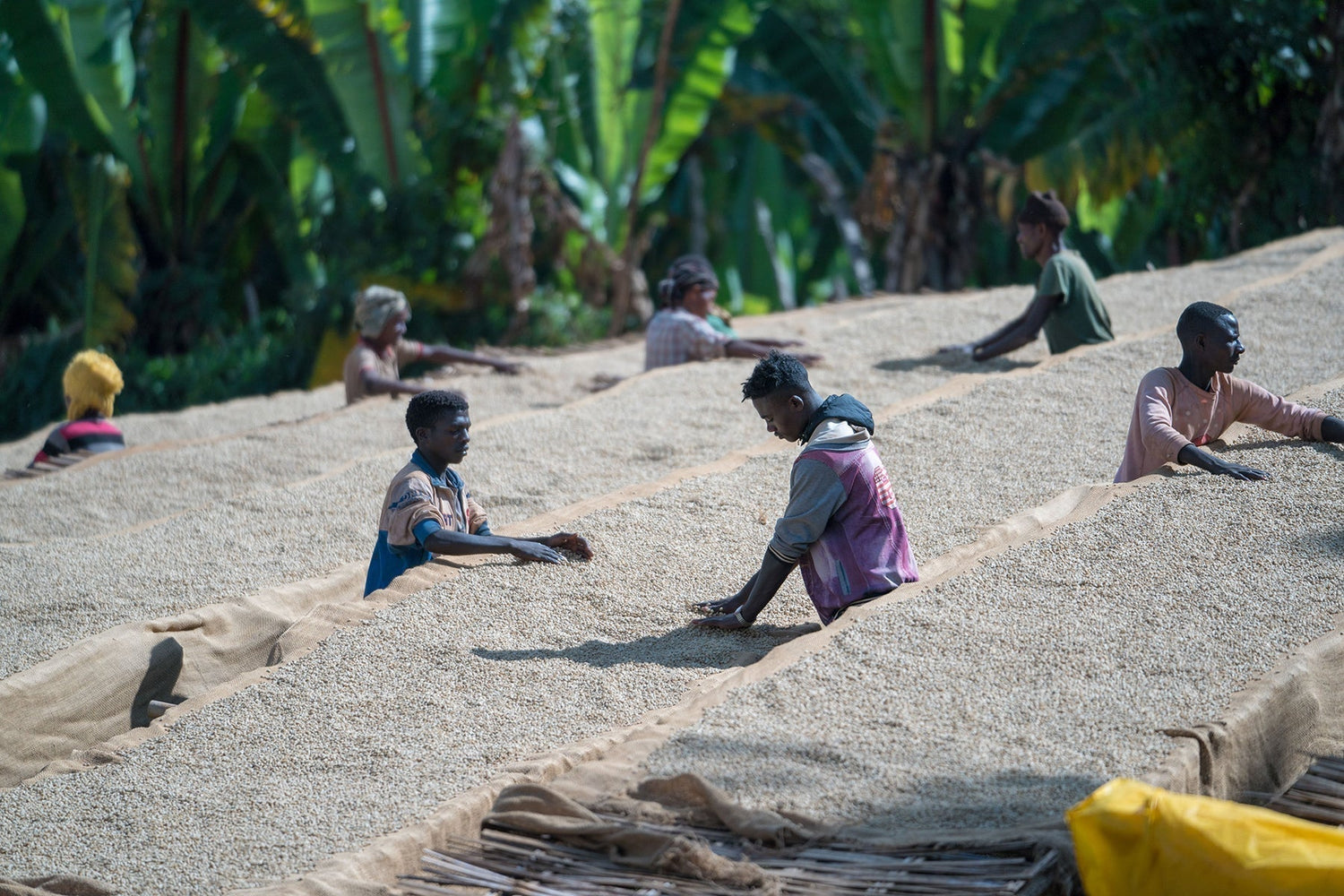The specialist magazine crema has named Wildkaffee “Roaster of the Year 2023” . The trade magazine has been awarding this prize since 2008 and since the evaluation is carried out by an independent jury of experts, the award is recognized and desirable in the scene . It is considered one of the highest honors in the German-speaking coffee and roasting scene .

Roaster of the Year - the selection process
The jury looks at three main criteria when making its assessment : the quality of the coffee on offer, the roastery's performance in terms of delivery, service and the packaging used, and the company's sustainability and fairness, particularly in terms of purchasing conditions. These include fair trade and direct trade. These points were examined by the jury over the course of a year using several test purchases, which allowed for any fluctuations in quality to be taken into account and the services to be assessed to be evaluated over an extended period of time. The roastery is not aware of this , so it cannot embellish or influence the test purchases in any other way.
“When the magazine called in May to tell us about the decision, we were very surprised at first. Then we were very happy,” remember Wildkaffee founders Steffi and Hardi Wild.
Only roasters in German-speaking countries are tested. The selection of the roasters to be tested and the test itself are carried out by a jury of independent experts and specialist journalists. The award for “Roaster of the Year” is one of the highest honors in the German-speaking coffee and roasting scene . The publisher and editorial team of “crema Magazin” guarantee a fair and independent competition.
Roaster of the Year – The Beginnings of Wild Coffee
Leonhard, known as Hardi, and his wife Stefanie Wild began their careers as professional athletes : he in ice hockey – for SC Riessersee, the Kölner Haie and the EHC Munich, among others. She on the ski slopes in slalom and giant slalom. It was clear to both of them that they needed to find another way of earning money after their careers ended. In 2004, they started their own business in the catering industry alongside sport. First with a Subway restaurant in Garmisch-Partenkirchen based on the franchise principle, one of the first in all of Bavaria. "We quickly realised that coffee is our passion," says Hardi. "As an athlete, you drink a lot of coffee!" In 2006, he took his first barista course and developed his first café concepts. Two years later, roasting was added. In 2010 the time had come: the couple founded Wildkaffee.
Roaster of the Year – Wild Coffee Today
Wildkaffee and its roastery are now located in Farchant and have almost ten employees. There is also the Wildkaffee Café in Garmisch-Partenkirchen, which is run by a long-time employee . At the end of July, Wildkaffee 2.0 will open in Vienna under the leadership of long-time friend, business partner and Brewers Cup Champion Martin Wölfl. Wildkaffee's product diversity is reflected in its broad customer base: from restaurants to office customers and coffee shops to online resale platforms. However, the focus is strongly on the company's own online shop . "Anyone who wants good coffee and understands our philosophy and can represent the values we have is a good customer for us, no matter how big or small!" emphasizes Steffi Wild.
Roaster of the Year – Direct Trade
In the beginning – when the company was founded – Wildkaffee bought its green coffee the traditional way: people were sent price lists and ordered coffee from them. However, after several trips to the countries of origin, it quickly became clear that they no longer wanted to buy coffee of unknown origin , but wanted to know exactly how their coffee was grown and what the working conditions were like. So Wildkaffee began building up its own trading network in 2012 so as not to have to make any compromises when it comes to green coffee. Too many middlemen ruin the price and, above all, not enough of it ends up with the coffee farmer. The company now sources 85 percent of its green coffee directly from the farmers, with whom it maintains regular, personal contact.

Roaster of the Year – Social Projects and Sustainability
But "direct trade" is not enough for wild coffee. Basically, the aim is not just to buy good green coffee for oneself, but also to improve the situation for local coffee farmers . That is why the roastery also supports social projects, including in Rwanda, and has started its own project in El Salvador .
Coffee School Project in El Salvador
One of the pilot projects is the Buenos Aires Coffee School Project . A few years ago, El Salvador was still known for its unique coffee . Due to crime, corruption, low prices and coffee plants infected with leaf rust , the coffee market in El Salvador came to a standstill . And this despite the fact that the country has perfect conditions for growing specialty coffee. The Buenos Aires region lies in the middle of a picturesque landscape, right next to the Santa Ana volcano . The unique location of this area, the nutritious soil and the many abandoned plantations prompted us to act! Together with QC Coffee & Rodolfo Ruffatti , Wildkaffee has bought one of these abandoned coffee farms . "We are using this to offer local coffee farmers a new perspective," describes Hardi Wild.
The social coffee project offers farmers full support with regard to new techniques, high-yield cultivation, processing and support in the distribution of the harvest. In addition , joint processing facilities have been created to reduce costs for smaller farmers. Together with the entire farming community, the social coffee project ensures that new varieties are grown and improved. This expands the farmers' portfolio, which gives them a powerful advantage in the flourishing coffee market .
Community Coffee Rwanda Project by Eric Wright
Coffee from Rwanda is a real specialty . It is precisely the fine, straightforward notes of berries and other fruits that make the varieties from Rwanda something very special. However , most farmers in Rwanda are already very old. Over the years, they have unfortunately neglected the care and attention to their coffee plants , which is why quality, infrastructure and ultimately yields have declined rapidly. This forced some farmers to abandon their plantations or switch to other agricultural crops such as plantains, cassava and the like. The American Eric Wright took up these obstacles in 2017 - he founded the Community Coffee Rwanda Project (CCR) . Interestingly, Eric developed his love for specialty coffee late in life. Before that, he worked as a lawyer in the USA. However, with the lease of his first washing station in the south of Rwanda, he embarked on a completely new professional path and from then on promoted the structures of specialty coffee cultivation in Rwanda. After two years and the successful structuring of several farms, Eric decided to expand . He invested in an area where no coffee had yet been cultivated and established additional plantations there. He also leased two more washing stations. The result is convincing across the board. Eric is now responsible for the existence of more than 800 farmers who, thanks to the helpful training, can deliver consistently high quality coffee. Since 2019, Wildkaffee has been sourcing its coffee from the CCR project, thereby supporting Eric's work.

La Palma - the Canary Islands
Another project of the “best roasters of the year 2023” is specialty coffee from Europe . With “La Palma Geisha”, Wildkaffee has released the first European specialty coffee from the Canary Islands . Business partners and coffee farmers Rosi Pombrol and Jens Kimmel from Finca Anthea Café are also responsible for the resurgence of coffee from the Canary Islands. Further projects are planned for the future: the establishment of a local coffee school and coffee trips in Europe. “You can get to the coffee plantation from Munich on a direct flight in four and a half hours,” says Hardi. “Of course, that makes the whole thing a bit easier.”

Waste and biogas from
Roaster of the Year
The way the roastery in Farchant handles garbage and waste ensures even greater sustainability . Every box and all filling materials are reused in the shipping department. The skins that are left over from the roastery after the roasting process are converted into biogas in the local organic waste recycling plant, and the roastery's coffee bags are made from just one valuable material, kraft paper, and are therefore 100 percent recyclable .
Roaster of the Year - Conclusion
Wildkaffee is constantly expanding its "direct trade" and is trying to source all of its green coffee directly from farmers in the countries of origin in the long term. The roastery is now delighted to have been named "Roaster of the Year" by crema trade magazine. It is important to Steffi and Hardi to emphasise how important the team is. "We are only a small part of the company, we founded it and built it up. But praise is also due to all of our employees who have made great progress with Wildkaffee. Roaster of the Year is not just us, but our roasting master, the entire team and not forgetting the farmers. They simply do such an important job."


